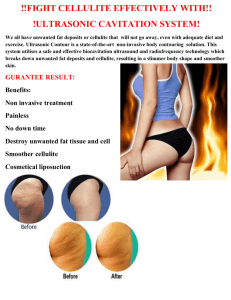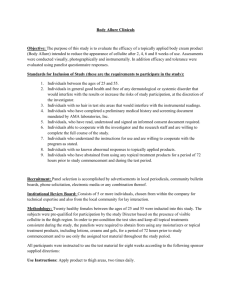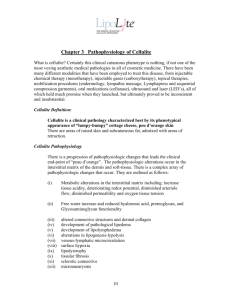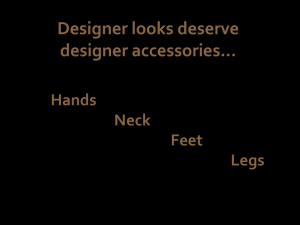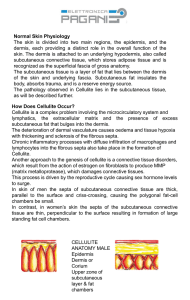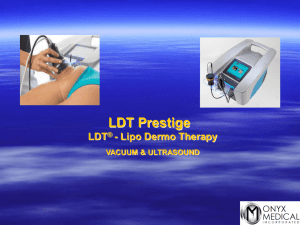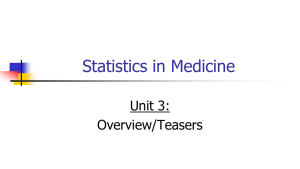Cellulitt1
advertisement
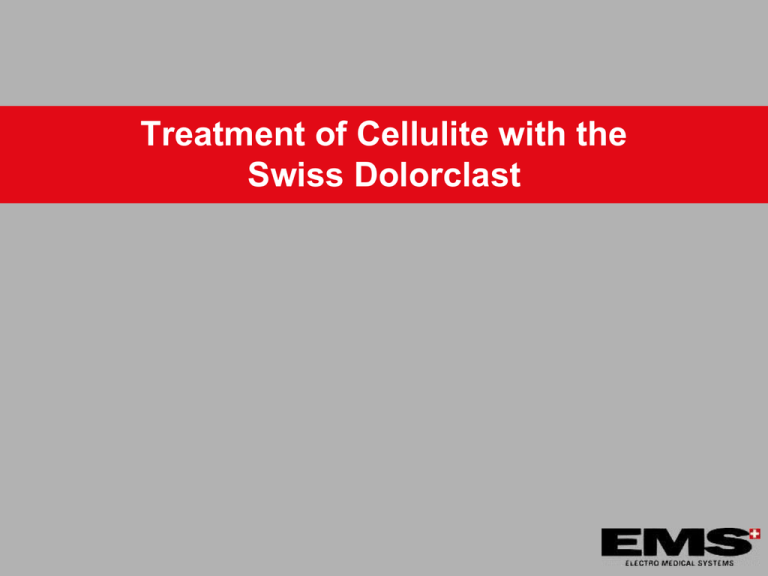
Treatment of Cellulite with the Swiss Dolorclast Preface • • • The application settings outlined herein (handpiece, applicator, number of treatments, number of impulses per treatment, frequency, air pressure) are non-binding recommendations. They are based on reports by experts in the field. Patients should not experience dyscomfort, or feel pain, when treated for cellulite. This is because treatment for this indication with radial shock waves does not aim at activating the peripheral nervous system. The Swiss Dolorclast Smart is approved for the treatment for cellulite. The corresponding approval of the Swiss Dolorclast Classic and Master is pending. Cellulite – brief introduction Clinical picture Picture taken from http://en.wikipedia.org/wiki/File:Cellulite-2.jpg Histology Cellulite Smooth skin Picture taken from www.istockphoto.com/stock-photo-2643756-cellulite-cross-section.php © www.istockphoto.com Definition, Epidemiology, Etiology Topographic skin change, evident by skin dimpling and nodularity Occurence mainly in women on the – pelvic region – lower limbs – abdomen Presentation as herniation of subcutaneous fat with fibrous connective tissue Occurence in 80-90% of the postpubertal females Rarely seen in males Cause Poorly understood Potential contribution: – Changes in metabolism and physiology – Alterations of • connective tissue structure • hormonal factors • genetic factors • the microcirculatory system • the extracellular matrix – Subtle inflammatory alterations Predisposition Gender (females > males) Race (caucasians > african americans / hispanics) Biotype Distribution of subcutaneous fat Predisposition to lymphatic and circulatory insufficiency Grading Grade 1: minimal dimples / surface inhomogeneities Grade 2: orange peel appearance, thinned epi-/dermis Grade 3: dimples / micronodules / striations Grade 4: palpable macronodules / striations Note: other authors may use different gradings Treatment options (1) Khan et al., J Am Acad Dermatol 2010;62:373-384: Treatment modalities range from topical creams to invasive procedures, such as laser-assisted lipolysis and liposuction There is no single treatment of cellulite that is completely effective Future treatment options for cellulite depend upon our understanding of the molecular basis and hormonal influences of cellulite adipose tissue Treatment options (2) Levels in Evidence-Based Medicine IA: Meta-analysis of randomized clinical trials (RCTs) that had enough power to demonstrate a statistically significant health outcome IB: II: RCTs that had enough power to demonstrate a statistically significant health outcome III: IV: Nonrandomized concurrent cohort comparisons between contemporaneous patients V: Case series without control subjects RCTs trials with results that were not statistically significant but where a larger trial might have shown a clinically important difference Nonrandomized historical cohort comparisons between current patients and former patients (from the same institution or from the literature) Treatment options (3) Treament options and corresponding Evidence levels Weight loss (Level II) Endemology (Level II) Liposuction (Level III) Subcision (Level IV) Mesotherapy (Level II) Topical phospotidylcholine and LED (Level IA) Radiofrequency devices (Level II) Ultrasound (Level II) Laser-assisted lipolysis (Level IA) Topical herbs and retinol (Level II) Carboxy therapy (Level II) Cryolipolysis (Level IV) Why treatment for cellulite with shock waves? Preliminary reports in the literature, describing treatment for cellulite with extracorporeal shock waves (single case studies and case series) Angehrn et al., Clin Interv Aging 2007;2:623-630 (Level V) Christ et al., Aesthet Dermatol 2008:1:6-14 (Level III) Christ et al., Aesthet Surg J 2008;28:538-544 (Level III) Kuhn et al., Clin Interv Aging 2008;3:201-210 (Level V) Sattler et al., Aesthet Dermatol 2008;2:17-25 (Level III) Recommended treatment protocol for cellulite using the Swiss Dolorclast Treatment protocol (1) Application of coupling gel (no need for palpation and labeling because the treatment area is visually identified) 15 Treatment protocol (2) Treatment with the Power+ handpiece • Applicator: 36 mm Planar • Number of treatments: 8 (two treatments per week) • Number of impulses per treatment: 200 – 300 per cm2 cellulite skin (approximately 3,500 per skin region) • Frequency: 8 - 20 Hz • Air pressure: 3 - 4 bar • Literature: EMS (ongoing clinical study) 16 Results achieved with the recommended treatment protocol (pilot study) Results Patient # Age Body Mass Index (BMI) Pain (VAS score) (a) Comfort during treatment (b) Satisfaction about treatment (b) Cellulite Stage before treatment Cellulite Stage after treatment Cellulite Stage difference 1 34 21.8 3.5 7 5 2.5 1 1.5 2 35 20.8 3 5 6 2.5 1.5 1 3 38 24.6 9 (c) -- (c) -- (c) -- (c) -- (c) -- (c) 4 55 20.3 1 7 7 2 1.5 0.5 5 48 21.9 4 5 7 2.5 1.5 1 6 51 22.9 3 5 8 2.5 0.5 2 7 29 32.9 2 5 5 3 1.5 1.5 8 23 31.6 3 8 3 2.75 2.75 0 9 57 19.7 3 5 7 3 2.5 0.5 10 51 22.2 5 5 6 2.75 1.5 1.25 11 29 20.8 2 5 1 2 1.5 0.5 12 43 20.4 3 5 7 2.5 1.5 1 13 51 24.2 3 7 7 2.5 1.5 1 14 4 19.6 3 8 6 2.5 1.5 1 15 43 18.7 4 6 1 2 1.75 0.25 Average : 41.8 22.8 3.0 5.9 5.4 2.5 1.57 0.9 (a) 0 = no pain; 10 = maximum pain (b) 0 = worst; 10 = best (c) drop-out because of pain Conclusions (from our pilot study – Level V) Treatment for cellulite with the Swiss Dolorclast is safe efficient in patients with cellulite grades 2 and 3 able to reduce the cellulite grade by one grade on average Treatment outcome does not correlate with age, body height, body weight, and BMI Treatment outcome is not permanent but lasts for several months
